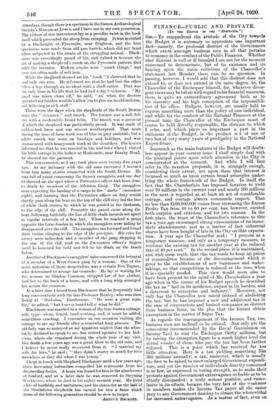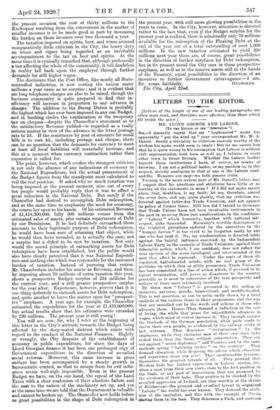FINANCE—PUBLIC AND PRIVATE. iTo TEE EDITOR. or TEE " SPECTATOR.")
Sat,—To comprehend the attitude of the City towards the Budget it is necessary to appreciate one important fact—namely, the profound distrust of the Government which exists amongst business men in all that pertains to economy in the conduct of the Public Finances. Whether that distrust is well or ill founded I am not for the moment concerned to demonstrate, but of its existence and its bearing upon the main criticisms of the Chancellor's statement last Monday there can be no question. In passing, however, I would add that this distrust does not extend to, or does not extend in the same degree to, the Chancellor of the Exchequer himself, for, whatever diver- gent views may be taken with regard to his financial measures, there is quite an extraordinary agreement both as to his sincerity and his high conception of the responsibili- ties of his office. Budgets, however, are usually held to express something more than the policy of one individual, and while for the conduct of the National Finances at the present time the Chancellor of the Exchequer must of course be held directly responsible, the distrust to which I refer, and which plays so important a part in the criticisms of the Budget, is the product nut of one or two but of very many years of prodigality in the National Expenditure.
Inasmuch as the main features of the Budget will doubt- less appear in your current issue, I shall simply deal with the principal points upon which attention in the City is concentrated at the moment. And while I will first refer to the taxation proposals, it is, strangely enough, considering their extent, not upon these that interest is focussed so much as upon certain broad principles under- lying the whole framework of the Budget. In itself the fact that Mr. Chamberlain has imposed taxation to yield over 70 millions in the current year and nearly 200 millions in the next is regarded as at least an act of considerable courage, and courage always commands respect. That no less than £100,000,000 comes from increasing the Excess Profits Tax from 40 to 60 per cent. has, however, excited both surprise and criticism, and for two reasons. In the first place, the tenor of the Chancellor's reference to this tax a year ago encouraged strong expectations of its imme- diate abandonment, and as a matter of fact industrial shares have been bought of late in the City on that expecta- tion. A year ago the Chancellor said : " I propose as a temporary measure, and only as a temporary measure, to continue the existing tax for another year at the reduced rate of 40 per cent." In the second place, it is maintained., and with some truth, that this tax tends to keep up prices of commodities because of the discouragement which it gives to the establishment of new businesses and under- takings, so that competition is reduced at the time when it is especially needed. This view would seem also to have been present to the mind of Mr. Chamberlain a year ago when in the course of his Budget speech he described the tax as " bad in its incidence, unjust in its burden, and a deterrent to enterprise and industry." Moreover, not only has the Chancellor now raised instead of abolishing the tax, but he has imposed a new and additional tax in the case of corporations and limited companies as distinct from business firms, on the plea that the former obtain exemption in the matter of Super Tax.
As regards the rearrangement of the Income Tax, too, business men are inclined to be critical. Not only are the concessions (recommended by the Royal Commission on Income Tax) to cost the Exchequer thirty millions, but by raising the exemption figure to a much higher level the actual number of those who pay the tax has been further reduced. This is a point which has received far too little attention. Here is a tax yielding something like 360 millions annually, a tax, moreover, which is usually the first to be raised to meet enlarged Government expendi- ture, and yet the number of individuals directly concerned is so few, as expressed in voting strength, as to make their protests against Government extravagance so feeble as to be utterly disregarded: a truly serious position, and cumu- lative in its effects, because the very fact of the weakness in numbers makes the Income Tax payer all the easier prey to any Government desiring to obtain the wherewithal for increased extravagance. As a matter of fact, even on the present occasion the cost of thirty millions to the Exchequer resulting from the concessions in the matter of smaller incomes is to be made good in part by increasing the burden on those incomes over two thousand a year.
The taxation imposed on spirits, beer, and wines aroused comparatively little criticism in the City, the heavy duty on wines and cigars being regarded as an inevitable accompaniment to the tax on beer and spirits. At the same time it is cynically remarked that, although professedly a tax affecting the whole of the community, it will doubtless in reality fall back upon the employer through further demands for still higher wages.
The disclosure that the Post Office, like nearly all State- controlled industries, is now costing the nation many millions a year came as no surprise ; and it is evident that ere long telephone charges are also to be raised, though the business community is quite prepared to find that in- efficiency will increase in proportion to any advance in charges. The addition to the Stamp Duties is probably the highest which has ever been imposed in any one Budget, and in banking circles the continuation of the twopenny tax on cheques—despite the Chancellor's statement as to the satisfactory Revenue yielded—is regarded as a really serious matter in view of the advance in the letter postage rate to 2d. If the remittance by post of amounts for small bills is to cost 4d., including postage and cheque, there can be no question that the demands for currency to meet at least all local liabilities will materially increase, and this at a moment when currency contraction rather than expansion is called for.
The point, however, which evokes the strongest criticism is not only the absence of any indications of economy in the National Expenditure, but the actual presentment of the Budget figures from the standpoint most calculated to veil the real position. If asked why so much taxation was being imposed at the present moment, nine out of every ten people would probably reply that it was to effect a great reduction in the National Debt. But surely if the Chancellor had desired to accomplish Debt redemption, and at the same time to emphasize the need for economy, the course lay open to his hands. Of his estimated Revenue of £1,418,300,000, fully 300 millions comes from the estimated sales of assets, plus certain repayments of Debt by our Dominions. If he had definitely earmarked these amounts to their legitimate purpose of Debt redemption, he would have been sure of attaining that object, while he would then have revealed, as is actually the case, not a surplus but a deficit to be met by taxation. Not only would the sound principle of earmarking assets for Debt redemption have been established, but the public would also have clearly perceived that it was National Expendi- ture and nothing else which was responsible for the increased burden of taxation. Instead of pursuing that course, Mr. Chamberlain includes his assets as Revenue, and then, by imposing about 70 millions of extra taxation this year, shows a prospective Budget surplus of 234 millions for the current year, and a still greater prospective surplus for the year after. Experience, however, proves that it is one thing definitely to earmark assets for Debt redemption, and quite another to leave the matter open for " prospect- ive ' surpluses. A year ago, for example, the Chancellor estimated the expenditure for the year at Z1,435,000,000, but actual results show that his estimates were exceeded by 230 millions. The present year is still young ! You will see now, Sir, why I refer at the beginning of this letter to the City's attitude towards the Budget being affected by the deep-seated distrust which exists with regard to the conduct of the National Finances. Rightly or wrongly, the City despairs of the establishment of economy in public expenditure, for since the days of Lloyd Georgian finance it has been one prolonged orgy of Government expenditure in the direction of so-called social reforms. Moreover, this same increase in gross outlays has been accompanied by a steady growth in bureaucratic control, so that to escape from its evil influ- ences seems well-nigh impossible. Even in the present Budget we have, on the one hand, the repeal of the Land Taxes with a dear confession of their absolute failure and the cost to the nation of the machinery set up, and yet at the same time we are told that the Departmeht is valuable and cannot be broken up. The Chancellor now holds before Is great possibilities in the shape of Debt redemption in the present year, with still more glowing possibilities in the years to come. In the City, however, attention is directed rather to the fact that, even if the Budget surplus for the present year is realized, there is admittedly only 70 millions available for the redemption of the Floating Debt at the end of the year out of a total outstanding of over 1,000 millions. In the new taxation estimated to yield 200 millions next year there are, of course, great possibilities in the direction of further surpluses for Debt redemption, but in its present mood the City sees in those prospective surpluses, as well as in the reserve assets still in the hands of the Treasury, equal possibilities in the direction of an incentive to further Government extravagance.—I am,



































 Previous page
Previous page